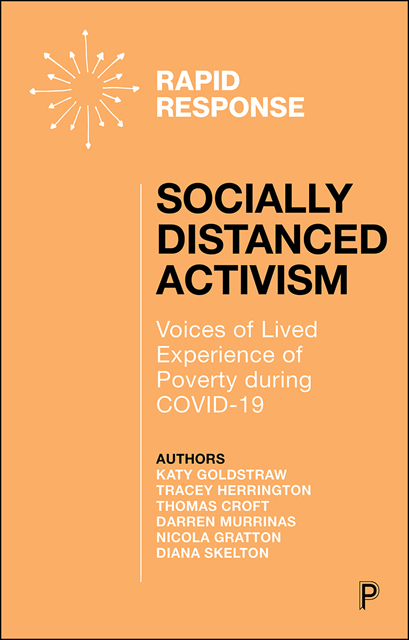Book contents
- Frontmatter
- Dedication
- Contents
- Acknowledgements
- Introduction: our voice means something
- 1 “Why aren’t we heard with our voices?” APLE Collective’s lived experience of poverty
- 2 APLE Collective and pandemic activism
- 3 Thriving women
- 4 ATD Fourth World: overcoming epistemic injustice globally
- 5 Finding a place in a disconnected world: Expert Citizens and Keep Talking
- 6 Conclusion: power, voice and change
- Notes
- References
1 - “Why aren’t we heard with our voices?” APLE Collective’s lived experience of poverty
Published online by Cambridge University Press: 14 April 2023
- Frontmatter
- Dedication
- Contents
- Acknowledgements
- Introduction: our voice means something
- 1 “Why aren’t we heard with our voices?” APLE Collective’s lived experience of poverty
- 2 APLE Collective and pandemic activism
- 3 Thriving women
- 4 ATD Fourth World: overcoming epistemic injustice globally
- 5 Finding a place in a disconnected world: Expert Citizens and Keep Talking
- 6 Conclusion: power, voice and change
- Notes
- References
Summary
Inspiration isolation
Silenced voices gather ’round,
listen you can speak,
Collective whispers make bigger sounds,
from those once considered weak,
it makes more sense than shouting fools,
considered at their peak,
as Inspiration comes and goes,
doubt in and out does creep,
a barrier or revolving door,
it’s a creative hide and seek,
scribble it down, let it ferment,
come back and give a tweak,
perhaps unfinished, the latest draft,
just keep moving to its beat.
(Simon Bamford, 2020, member of APLE Collective
[Expert Citizens, 2020])
This chapter will discuss the term lived experience and set it within the work of APLE Collective member organisations. This term has become a funders’ buzzword. Although reference was made to lived experience by Van Manen (1990) and approaches such as participatory action research (McTaggart, 1997) and coproduction (Ryan, 2012) seek to work with, share power with and seek social change with communities, the term has become in vogue in recent funding rhetoric (Fledderus, 2015). It is important to note the intersectionality (Crenshaw, 1990) of our lived experience which means it cannot and should not be a phrase used generically. It is vital when making decisions that will affect people’s lives and livelihoods that those with lived experience of the issue are listened to and their voices involved in policy and strategic decision making, whether this is at a national or local level, as the words of this poem by ATD Fourth World member Séamus Neville illustrate so clearly:
Oh why, oh why aren’t we heard with our voices?
We cry aloud but we are not heard.
Oh why oh why should we do as we are told by people of authority but we are not heard?
Oh why oh why do they take our children away from us?
Oh why oh why do they put out children into children’s homes?
Oh why oh why do they take our parenting rights away from us?
Oh why, oh why do we suffer in silence?
Oh why oh why do we feel ashamed, as if we have committed a crime?
Oh why oh why do we hide ourselves from humanity?
Oh why oh why aren’t we heard by our voices?
- Type
- Chapter
- Information
- Socially Distanced ActivismVoices of Lived Experience of Poverty During COVID-19, pp. 11 - 30Publisher: Bristol University PressFirst published in: 2023



